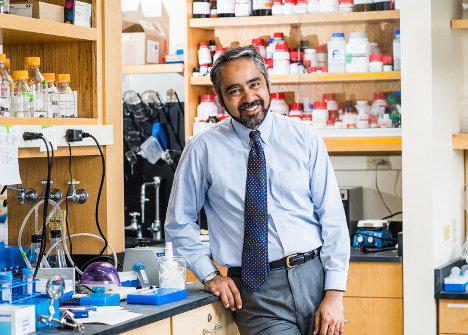“My career, in both its trajectory and the research problems that I study, has been profoundly influenced by the environment that I grew up in,” Boston University’s Professor Muhammad Zaman says.
Dr. Zaman’s academic career spans multiple fields, including biomedical engineering and international health. He has received a number of accolades from USAID, the American Society for Engineering Association, and multiple universities, just to name a few.
But outside of his already ground-breaking academic endeavors, Dr. Zaman finds ways to improve lives all around him. He works to bring education equality to various corners of the world, as well as equal access to healthcare for all.
Groundbreaking research from Dr. Muhammad Zaman
Currently, Dr. Zaman teaches biomedical engineering and international health at Boston University. He also runs his own biomedical lab. The lab particularly oversees cancer research and the improvement of health systems.
Much of his work uses state-of-the-art technology to simulate or recreate environments in which to study cancer cells. But as time went on, Zaman’s lab expanded out to other projects, tapping into his ever-present interest in global and refugee health. A current project focuses on the growing sales of fake, ineffective, or poorly made medicines. “One of the main projects that we have started, and become a leader in, is in developing solutions to detect, and decrease the prevalence of substandard and counterfeit medicines,” explains Zaman.
He calls these scams “a growing menace” that “now account for nearly 10-20% of all pharmaceutical sales worldwide.” He estimates that this shady industry moves around 70 billion USD annually. “Marginalized groups, women, children, poorer communities and refugees are particularly impacted by poor quality medicines.”
Dr. Zaman has received many accolades and funding prizes for this work. He also extends his knowledge to the world through publications, including multiple books and regular contributions to big names such as Express Tribune, Huffington Post.
An early start in scientific study
“For as long as I can remember, I was fascinated by chemistry and how to make ‘stuff’,” Dr. Zaman recalls.
His curious mind brought him great scholarly success, even as a child. He came second in the entirety of his native Pakistan in the Higher Secondary School Certificate exams. He then earned degrees from Arkansas Tech, University of Chicago, and MIT.
His cancer research during this period helped shine a light the process of metastasis. He describes this as “a process that is responsible for nearly all cancer related deaths.” This includes the death of his own father fifteen years ago.
Soon, while teaching at the University of Texas at Austin, Dr. Zaman’s cancer research joined with his “nascent” interest in social issues. After three years, he transferred to Boston University. There, he started actively pursuing both further cancer research and his interest in public health.
“I started off with small undergraduate projects,” he remembers. “But pretty soon, given my familiarity with Pakistan, my personal, social and academic network in the developing world, strong mentorship from colleagues at the school of public health and the passion of motivated students, the projects started growing substantially with new grants coming in from all over the world.”
Now, Dr. Zaman draws on these new opportunities to face issues he saw throughout his life. “I have come to recognize that issues of global injustice, especially when it comes to refugees, requires new ideas and new ways to understand the challenges facing stateless and voiceless people,” he explains. “My lens to address this problem is rooted in my own personal background, my academic training and expertise, my field work and partnerships, and my own desire to bring new scholarship to old and stubborn problems affecting marginalized communities.”
Dr. Muhammad Zaman believes in interdisciplinary global solutions
“My interest in humanitarian projects is more a reflection of the world that I grew up in,” says Dr. Zaman. “And perhaps a recognition that I am extremely blessed and fortunate, and I owe it to myself and others to help anyone I can.”
In addition to pharmaceutical research, Dr. Zaman advocates for accessible healthcare in refugee camps and low-income areas all over the world. He is the co-director of the UN Africa Biomedical Initiative, and involved in the construction of multiple biomedical engineering programs in Kenya, Zambia, Uganda, and Ethiopia.
The prolific humanitarian has also founded a program focusing on refugee health at Boston University. Additionally, he heads a number of interscholastic efforts around the globe.
Dr. Zaman hopes to lead by example, combining his work in healthcare, public engagement, analysis, and more to truly help people. He emphasizes above all the “the need for true interdisciplinary work.”



